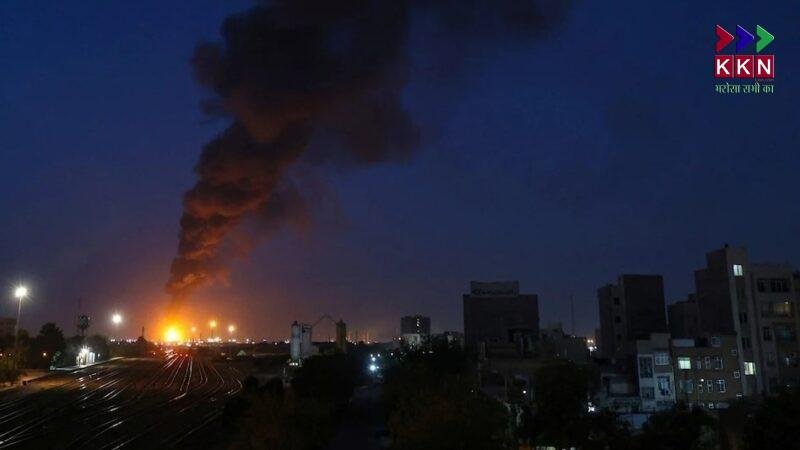KKN Gurugram Desk | As Israel’s relentless missile and drone strikes pound Iran’s major cities, the burden of war is falling squarely on Tehran’s citizens—and they’re paying a heavy toll. The conflict, known as Operation Rising Lion by Israel and Iran’s Operation True Promise in response, has entered a critical phase. But beyond the bombings and battlefield maneuvers, a deeper reality has emerged: Iran’s diplomatic isolation is growing, even among traditional allies.
Article Contents
Mass Evacuation: Iranians Fleeing Tehran
Mass evacuations are underway. Millions of Iranians are fleeing Tehran, abandoning homes in panic over escalating strikes. Caught between Hezbollah rockets and precision air raids, people are searching for safe havens—anywhere but Iran’s embattled capital.
U.S. President Donald Trump went a step further, urging Iranians to leave Tehran immediately, warning of a “major offensive” targeting the city. While the White House did not disclose operational specifics, this warning fueled speculation of a catastrophic escalation.
With each successive strike, officials, scientists, and military personnel have come under threat. But critically, Iran has found little sympathy on the global stage—even from Middle Eastern and Islamic nations that Tehran long considered allies.
Islamic Nations Sidestep Support
Earlier, Iran’s influence across the Islamic world appeared unshakeable. But now, none of its expected supporters—not Saudi Arabia, the UAE, Kuwait, nor other Sunni-majority nations—have offered meaningful backing.
Many of these countries, focused on economic growth and security, are choosing neutrality. Abstaining from UN condemnation against Israel, they’ve instead allowed Israeli operations to take place using their airspace—openly prioritizing national interest over religious solidarity.
Jordan, Oman, and Iraq also remain on the sidelines. Analysts note these nations are determined to avoid escalating the crisis, mindful of the profound internal and regional repercussions a broader war could bring.
Russia and China: Diplomatic Support, Not Military
Iran’s traditional backers—Russia and China—are offering rhetorical support but reticently so.
-
Russia, bogged down in the Ukraine war, provided S-300 air defense systems and Shahed-136 drones before 2025 but has refrained from intervention now, warning that military aid could escalate into a NATO confrontation.
-
China has condemned Israeli incursions and reaffirmed respect for Iran’s sovereignty. Yet, it has declined to support military escalation, providing only cyber and dual-use technologies prior to the war, remaining “neutral” in practice.
Both countries have introduced diplomatic motions at the UN Security Council—but avoided military commitments. Their cautious approach reveals a deliberate strategy: support without direct involvement.
Why Western Powers Fear Iran’s Nuclear Potential
Western leaders have long expressed concern over Iran’s nuclear ambitions, and current events only reinforce their position. Iran’s alleged funding and arming of proxy groups such as Hezbollah (Lebanon), Hamas and Islamic Jihad (Gaza), Houthi rebels (Yemen), and Iraqi Shiite militias feed into the narrative that the regime destabilizes the region.
Examples:
-
Hezbollah’s Beirut bombing (1983) and Argentina embassy attack (1992)
-
October 7, 2023—Hamas attack on Israel resulting in over 1,200 deaths
-
yemenite coastal attacks on shipping routes in 2019 and 2023–24
For Western powers, Iran’s network of proxies—and its nuclear potential—are red flags that justify strong defensive and diplomatic measures.
Middle East in Flux: Sunni Nations Realign
The Abraham Accords (2020) shifted Middle East alliances dramatically. Saudi Arabia and the UAE, previously influenced by Sunni-Shia divisions, have since improved ties with Israel, reducing pressure on Iran.
Following strategic calculations, these nations have:
-
Allowed Israeli overflights during strikes
-
Publicly condemned violence but taken no military stance
-
Continued their policies aimed at advancing regional stability and attracting foreign investment
Jordan and Oman have similarly prioritized national stability, giving Tehran little reason to expect solidarity.
Tehran’s Growing Isolation Amid the Israel-Iran War
Iran’s long-held image as a leader of the Islamic world is collapsing amid this war. With evacuations underway, missile and power disruptions, and no regional backing, Tehran now stands virtually alone.
The Israel-Iran war 2025 has triggered an urgent overhaul in Middle Eastern geopolitics. Iran’s isolation illustrates that its influence, which extended across conflict zones for decades, has diminished significantly, especially as geopolitical interests override religious alignment.
What Lies Ahead for Iran?
The coming weeks and months could be critical:
-
Escalation threshold: Will Iran retaliate through proxies (Hezbollah, Houthis) or attempt direct strikes?
-
Nuclear brinkmanship: Increased Iranian nuclear activity may prompt further sanctions or preemptive strikes by Western allies.
-
Proxy warfare expansion: New fronts could open as Iran responds regionally.
Simultaneously, local instability could intensify internal dissent, particularly as Tehran reels under continuous bombings.
‘Operation Rising Lion’ has delivered both a military blow and a diplomatic shock to Iran. Without traditional support lines, Tehran faces its most significant test to date.




